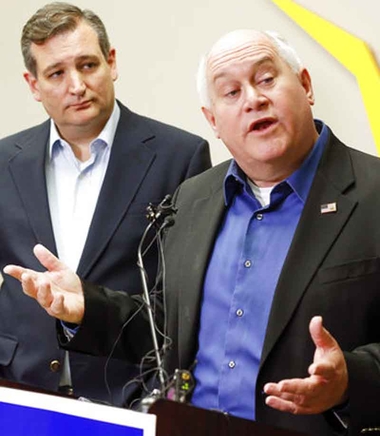Kansas outcome a warning to GOP as Georgia contest nears

Wichita, Kan. (AP) — Republicans pulled out a victory in Kansas in the first of four U.S. House special elections to replace GOP congressmen named to top jobs in President Donald Trump's administration, but the next contest for a seat in Georgia could be tougher to hold.
The margin of victory Tuesday for Kansas Republican Ron Estes in the 4th District special election slid to only seven percentage points from a 31-point margin in November, when incumbent Mike Pompeo was running before he was appointed Trump's CIA director.
In a further warning sign for Republicans, Estes narrowly lost the district's most populous county around the city of Wichita to his Democratic opponent James Thompson, a political newcomer. Trump won that county by 18 points.
The outcome was a shot across the bow of national Republicans as the party faces three more special elections in Georgia, Montana and South Carolina. Republicans now hold a 237-193 majority in the House.
"Republicans nationally should be very worried," said Bob Beatty, a Washburn University political scientist. "It's remarkable that Thompson got this close."
Both parties will now turn their attention to Georgia and the extremely competitive April 18 contest to replace Tom Price, who resigned to serve as Trump's Health and Human Services secretary.
Democratic hopes rest with Jon Ossoff, 30, a former congressional staffer turned investigative filmmaker who has raised more than $8 million, an extraordinary amount for a special election. Ossoff is counting on opposition to Trump to propel him to a decisive victory.
All 18 candidates from both parties will appear on one primary ballot, with polls suggesting that Ossoff will lead the first round of voting. Republicans are aiming to keep Ossoff below the majority required to win outright, forcing a two-person runoff — basically a Republican v. Democrat general election — on June 20.
The Republican candidates in Georgia have engaged in a bitter squabble and none of them has clearly emerged to lead the party.
While the Kansas result suggested some blowback against Trump, another important factor was anger with the state's unpopular Republican governor Sam Brownback.
Democrats tapped into voter frustration after Brownback made Kansas a laboratory for sweeping tax cuts that left the state short of revenue and facing a budget crisis. Brownback also refused to expand the Medicaid health program for the poor.
Lucy Jones-Phillips, a 31-year-old insurance representative and Democrat, acknowledged she doesn't vote in every election, but said she voted for Thompson because she wanted to register her disappointment in Brownback, especially his veto of an expansion of Medicaid.
"I can't stand Brownback," she said as she left her polling site in Belle Plaine.
In a sign of nervousness in the waning days of the campaign, Republicans poured money into the race to bolster Estes. Republicans pulled in U.S. Sen. Ted Cruz of Texas to campaign in Wichita for Estes, and both Vice President Mike Pence and Trump recorded robo calls for him.
Those GOP calls prompted Charlene Health, a 52-year-old homemaker and Republican in Belle Plaine, to cast a ballot for Estes.
"I wasn't even going to vote," she said as she left her polling site Tuesday morning. "I finally did. I realized this was important."
Republicans have represented the south-central Kansas district since 1994. The district has been hurt by the downturn in the agricultural economy and the loss of hundreds of well-paying, blue-collar jobs in aircraft manufacturing plants. Wichita is home to Koch Industries, the company led by conservative billionaire political donors Charles and David Koch.
By Roxana Hegeman, Associated Press. Copyright 2017 Associated Press. All rights reserved.
The Gayly – April 12, 2017 @ 6:50 a.m.





